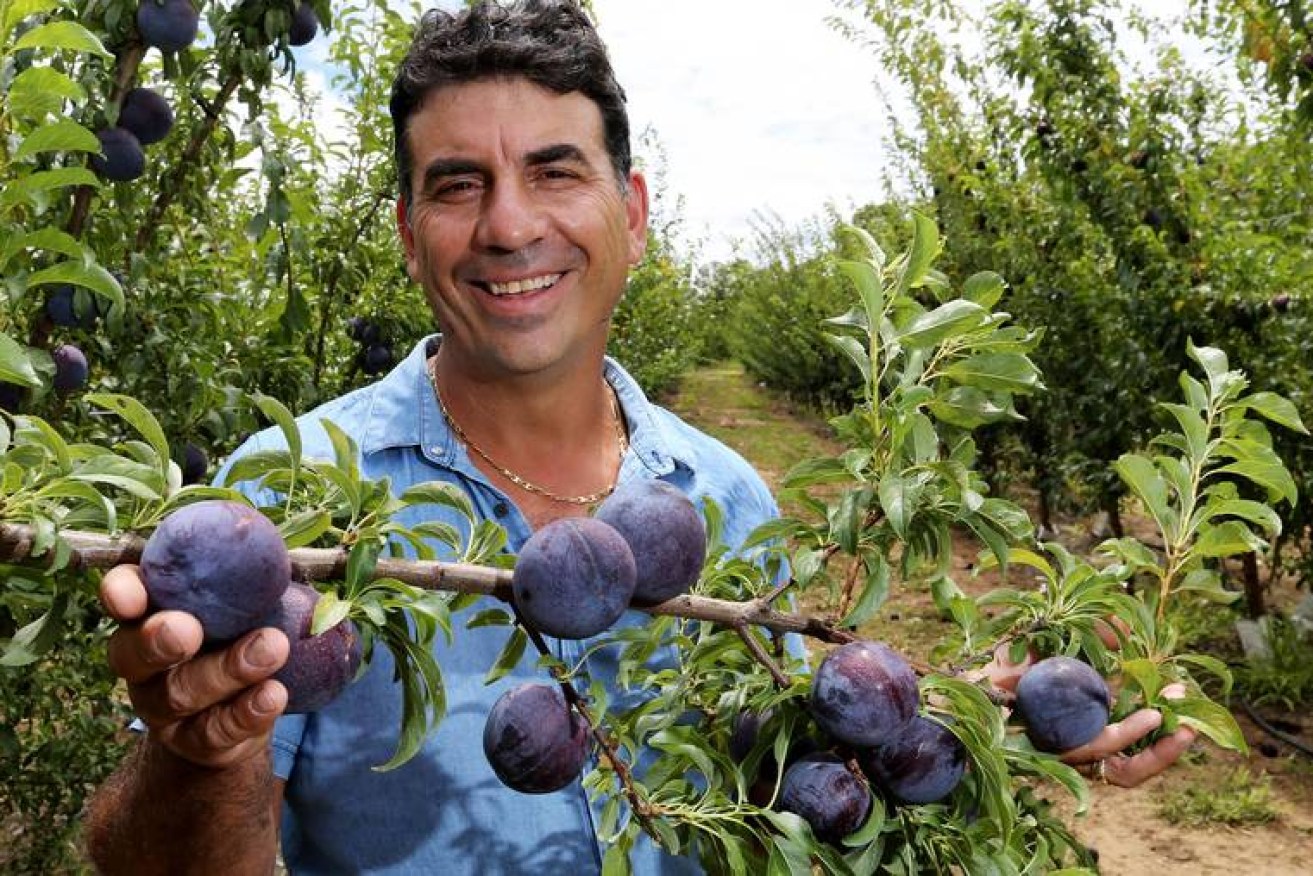Plum crazy: How a battle over Queensland ‘super fruit’ has ended up in court
The Queen Garnet plum was developed with the help of Queensland Government scientists and now everyone wants a piece.

Orchardist Sebastian Fiolo and the Queen Garnut plums ripening on his trees. (PICTURE NIC ELLIS THE WEST AUSTRALIAN)
A decade after the Government gave Nutrafruit the exclusive rights to the Queen Garnet plum, the company has taken action in the Federal Court accusing rivals of stealing the intellectual property to make money in China.
The Queen Garnet plum, actively promoted by the government, has been described as a superfood with the potential to lower blood pressure, reduce the risk of heart disease and provide other health benefits to those who eat it regularly.
The antioxidant-rich variety of plum costs consumers more than normal plums and Nutrafruit also sells a range of nectars, powders, tablets derived from the Queen Garnet.
In documents filed with the court, Nutrafruit alleges Victorian-based KY D-Pak has “propagated, planted, tended and grown approximately 15,000 – 20,000 trees of the Queen Garnet variety without the licence or authority of Nutrafruit”.
To support its claim, Nutrafruit has pointed to orchard maps, accounts of conversations with KY D-Pak boss Tony De Pasquale, and “limited random genetic testings which identified unauthorised Queen Garnet trees at KY D-Pak’s Kyabram, Victoria, orchard”.
Nutrafruit alleges that KY D-Pak arranged the export of three shipments to China earlier this year – one shipment alone contained 119 tonnes of plums – and supplemented another six shipments with the forbidden fruit.
“The fruit was labelled as ‘Ruby Royal’ in order to disguise the fact that they were, in fact, unauthorised fruit of the Queen Garnet variety,” Nutrafruit alleges in court documents.
This was without the authority of Nutrafruit and came as the company was organising its own exports to satisfy the Chinese market.
In response, KY D-Pak claims it only became aware of Nutrafruit’s rights to the Queen Garnet plum late last year. Not only that, but the “mother trees” on its orchard pre-dated Nutrafruit’s agreement with the government, according to KY D-Pak.
“In approximately 2005, De Pasquale’s father (dec) returned from a funeral in Swan Hill with some wood stock for a new variety of plum,” KY D-Pak states in its formal response, filed with the court.
“De Pasquale’s father grafted two rows of trees that were referred to by the family as the ‘mother trees’. No genetic testing was ever done on the ‘mother trees’. Trees were subsequently propagated, planted, tended and grown from the ‘mother trees’.”
If able to be proven, KY D-Pak’s defence would undermine the government’s agreement with Nutrafruit and the royalties it has received since 2010. Nutrafruit has since established a vast distribution network supplying major retailers.
While the government was named as a respondent in the case, it has yet to file any documents with the court and a spokesman for the Department of Agriculture and Fisheries declined to comment.
KY D-Pak, in the court documents, states that the company was willing to work with Nutrafruit rather than compete, and had offered to pay Nutrafruit $4 per tree in royalties, plus an annual tree royalty.
However, Nutrafruit is demanding further damages, including for the “devaluation” of its agreement with the government “as a consequence of the reduction in market price of authorised Queen Garnet Fruit exports achieved in China by reason of the flood of unauthorised fruit”.
Nutrafruit wants to use legal discovery and potentially a full audit to determine the number of illegal Queen Garnet trees in existence and how much of the fruit has already been exported.
The case is ongoing.

Queen Garnet products. Source: Nutrafruit












